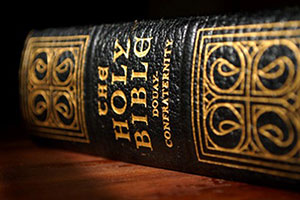

|
| Musical Musings: Liturgy |
|
|
Biblical OriginsThis article is reprinted from the booklet, A Minute in the Church: The Mass, by Sirius Catholic Radio personality, Gus Lloyd. It is reprinted here with the kind permission of the author. I. Introduction
"I don't get anything out of Mass."
That's how I respond to the second comment above. When someone says they're not getting "fed" at Mass, I remind them that they are being fed with the Bread of Life — Jesus. There is no greater food. No matter how bad the music is or how boring the preaching is or how unfriendly the congregation is, Jesus is present. I don't mean to disregard anyone's genuine feelings about their experience. I just want to stress that there is a greater spiritual reality that needs to be understood. Let me address briefly the first comment, "I don't get anything out of Mass." Like most everything in life, you only get out of it what you put into it. And if what you're putting into Mass is little of nothing, then that's what you'll get out of it. How well are you listening? How much do you understand about the things that are being said and done? Have you studied the deeper meaning behind the words, the rituals, the gestures? That's what these articles are for — to help you gain a little deeper understanding of the Mass. Finally, I want to share a brief thought about knowledge. It is vitally important that we have knowledge about our faith. We need to know the nuts and bolts, the deeper meaning behind what we do and say and believe. This I call head knowledge. Far more important is having heart knowledge. We must know Jesus Christ. Not just know about Jesus, but know Jesus. Without that all the head knowledge in the world won't amount to a hill of beans. I hope that while these articles help you know more about the Mass, you'll always be working on that heart knowledge part as well. II. Biblical OriginsThe Mass you attend may not look and sound just like a Mass that was celebrated even a half-century ago. But even though changes have been made through the centuries of how the Mass is celebrated, the Mass itself has been around since the beginning of the Christian Church. We see the first references in the Bible. The Mass had its beginnings at the Last Supper. You can read the accounts in the Gospels of Matthew, Mark and Luke. You'll note that to this day, the priest echoes the words of Jesus at every Mass. In Acts 2:42, we see that the very first Christians "devoted themselves to the teaching of the apostles and to the communal life, to the breaking of the bread and to the prayers." Here we see the Lituryg of the Word — the teaching of the apostles, and the Liturgy of the Eucharist — the breaking of the bread.
In I Corinthians 11, Saint Paul refers to the Mass when he writes, "For as often as you eat this bread and drink this cup, you proclaim the death of the Lord until he comes."
And, "Therefore whoever eats the bread or drinks the cup of the Lord unworthily will have to answer for the body and blood of the Lord."
Where does one go to "eat the bread and drink the cup" of the Lord? To Mass, of course!
Taken from A Minute in the Church: The Mass |
Submit Your Music / Contact Us / Company Description / Links
 At Mass we get to "eat the Flesh of the Son of Man and drink his Blood." [Jn 6:53]
I've often heard people say that Catholics don't have a personal relationship with Jesus.
At Mass, we get to take Jesus — Body, Blood, Soul and Divinity — into our very bodies.
He becomes part of us, one with us.
It just doesn't get any more personal that that, my friend.
At Mass we get to "eat the Flesh of the Son of Man and drink his Blood." [Jn 6:53]
I've often heard people say that Catholics don't have a personal relationship with Jesus.
At Mass, we get to take Jesus — Body, Blood, Soul and Divinity — into our very bodies.
He becomes part of us, one with us.
It just doesn't get any more personal that that, my friend.